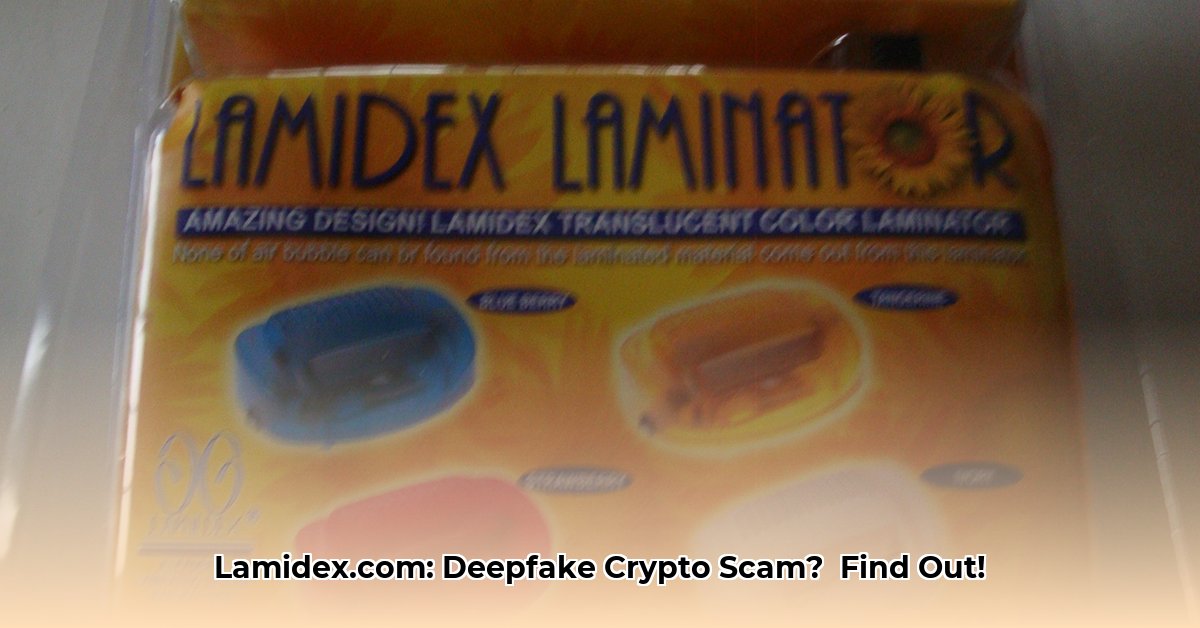
Lamidex.com: The Deepfake Crypto Scam That Stole Your Attention (and Maybe Your Money)
Lamidex.com wasn't a typical online scam; it was a sophisticated operation leveraging deepfake technology (realistic artificial videos) to deceive users. The website promised significant Bitcoin returns, employing convincing fake videos of celebrities to lure unsuspecting individuals. This seemingly simple approach proved devastatingly effective, resulting in substantial financial losses for victims. For more information on secure crypto practices, see this resource.
The Illusion of Free Bitcoin
The scam's operation was deceptively straightforward. Initially, Lamidex.com utilized flashy social media advertisements showcasing realistic deepfakes of prominent figures endorsing a Bitcoin giveaway. This created a powerful sense of legitimacy and trust, leading many to believe in the promise of easy money. Subsequently, the site demanded an "activation fee," deceptively framed as a necessary step to unlock the purported Bitcoin windfall. This "fee" was the crucial element of the theft; once paid, the funds disappeared, and the website vanished shortly after, leaving victims with nothing.
Deepfakes: The New Face of Online Fraud
Lamidex.com's success hinged on the realism of its deepfake videos. These weren't amateurish attempts; they were convincingly realistic, highlighting a growing concern: the malicious use of advanced technology for fraudulent activities. This raises a critical question: How can individuals distinguish between genuine celebrity endorsements and convincing deepfakes? The answer lies in maintaining healthy skepticism and rigorously verifying information from independent sources.
Lamidex.com and its Copycats: A Growing Trend
Lamidex.com wasn't an isolated incident. Experts suggest it's part of a larger trend, with similar scams employing identical tactics emerging online. This indicates a pattern of adaptable and organized criminal activity. The ease with which scammers create and abandon these websites after profiting further complicates efforts to track and prosecute them.
How to Spot Deepfake Cryptocurrency Scams on Social Media
Key Takeaways:
- Deepfake technology's sophistication makes detection challenging.
- Scammers often employ promises of high profits and urgent calls to action.
- Impersonating prominent figures is a common tactic.
- Never share your private keys or seed phrases.
- Verify information independently using multiple sources.
Lamidex.com serves as a stark warning about the dangers of deepfake cryptocurrency scams. This wasn't a simple con; it utilized advanced technology to exploit investor trust. Understanding how these scams operate is vital for protecting your digital assets.
Deceptive Tactics Employed by Lamidex.com
Lamidex.com used deepfakes to create an illusion of legitimacy. These videos, seemingly showing celebrities endorsing the platform, were designed to instill trust and bypass critical thinking. The scammers likely used AI to generate these realistic deepfakes, creating a sense of urgency and authenticity.
The first warning sign is the promise of excessively high returns in a short timeframe. Such promises often play on the fear of missing out (FOMO), a common psychological vulnerability exploited by scammers. Unrealistic profit claims are a major red flag.
Identifying Red Flags: A Step-by-Step Guide
This guide provides practical steps to avoid similar scams:
Verify the Source: Don't rely solely on social media. Independently research the cryptocurrency, company, and individuals involved using multiple reputable sources.
Beware of Urgent Calls to Action: Legitimate investments rarely demand immediate decisions. Urgent calls to action, especially coupled with unrealistic promises, are strong indicators of a scam.
Analyze Visual Media Critically: Although deepfakes are sophisticated, subtle anomalies might exist. Look for unnatural blinking, inconsistent lighting, or other inconsistencies. Use available deepfake detection tools; however, be aware that these are not foolproof.
Check for Official Statements: If a public figure is supposedly endorsing a cryptocurrency, verify this through official channels (website or verified social media accounts). Scammers frequently impersonate influential people.
Never Share Private Keys: Never share your private keys or seed phrases. No legitimate entity will request this information.
Use Reputable Exchanges: Stick to well-established and regulated cryptocurrency exchanges. Avoid unknown or new platforms with potentially inadequate security.
The Importance of Due Diligence
In the fast-paced world of cryptocurrency, due diligence is crucial. Don't solely rely on social media posts; always conduct thorough research before investing. If something seems suspicious, trust your instincts; they often signal a red flag.
Cointelegraph